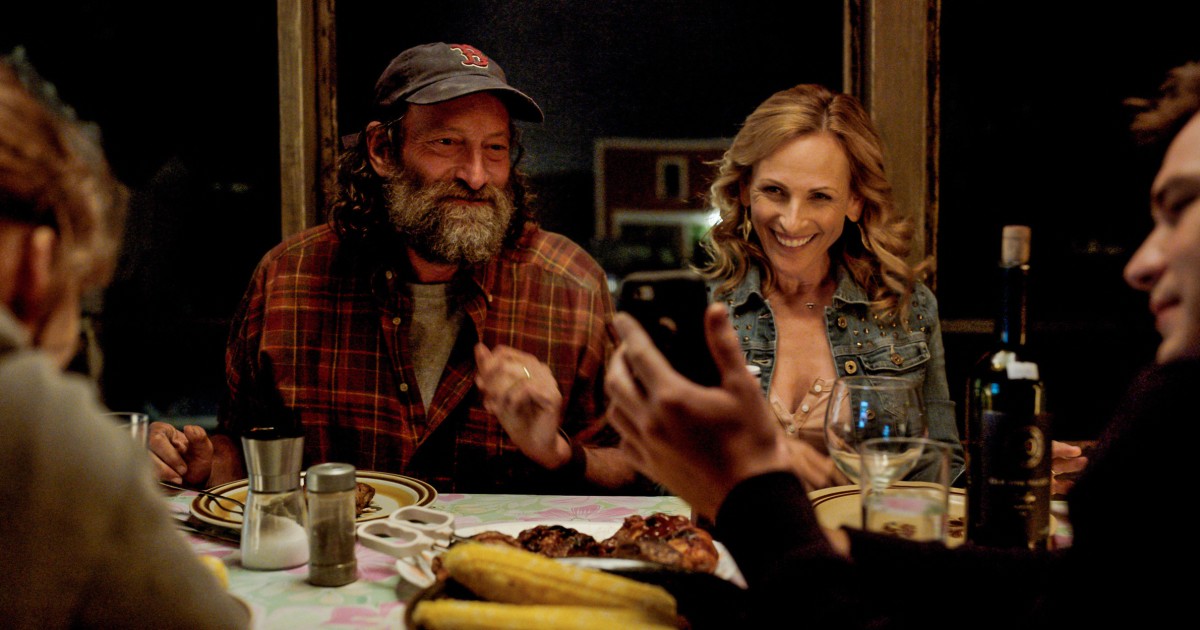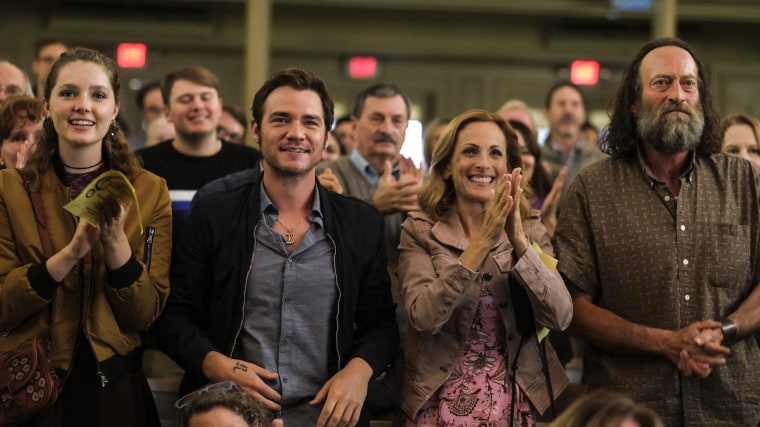
Troy Kotsur on ‘CODA,’ making Hollywood history and the movie that blew his mind
Hollywood’s awards season has been a whirlwind for “CODA” star Troy Kotsur.
In the lead-up to the Academy Awards, Kotsur has picked up best supporting actor trophies at the Screen Actors Guild Awards, the British Academy Film Awards and the Critics’ Choice Movies Awards — honors that cemented his status as an Oscar front-runner.
It’s a triumphant moment for an actor who, in his own telling, fought for years to gain a foothold in a film industry that traditionally creates scant opportunities for performers who are deaf or hard of hearing.
“It took me years of struggle and then, here I am, sitting here today,” Kotsur said in a recent Zoom interview, communicating enthusiastically through an American Sign Language interpreter.
Kotsur co-stars in “CODA” as Frank Rossi, a gleefully profane but essentially warm-hearted Massachusetts fisherman whose daughter, Ruby (Emilia Jones), aspires to be a singer — with an eye on leaving town to attend music school.
But supporting Ruby’s dreams could come at a steep cost for Frank, his wife, Jackie (Marlee Matlin), and their son, Leo (Daniel Durant), since Ruby is the only hearing member of the family and helps translate for her parents on a virtually daily basis.
Frank’s gradual acceptance of his daughter’s artistic ambitions is one of the key emotional threads of “CODA,” culminating in a father-daughter bonding scene too tear-jerkingly poignant to be spoiled here. (The movie is available to stream on Apple TV+.)
In an interview with NBC News two days after he won a pair of SAG prizes (for supporting actor and film ensemble), Kotsur spoke warmly about his breakout role, his long road to the Oscars and the pop culture that helped fuel his creativity.
The interview has been lightly edited for length and clarity.
It’s so nice to meet you.
It’s nice to meet you, too. Hey, check this out. [Kotsur holds up one of his Screen Actors Guild Awards for “CODA.”]
How does it feel to have that in your hand?
I didn’t expect it would be this heavy. I got two awards that night, so I had to hold them all night, and it was really hard to sign. I needed my hands free to sign. It was like holding two twin babies in my arms. It was a relief when I finally set them down. Last night, at the [Hollywood Critics Association Awards], there were three more, so how am I going to carry these on the plane? My wife took one award, and I might just have two more with me in my suitcase.
I’m really excited. I’ve been getting a lot of emails and messages. When I accepted the [SAG Award for best supporting actor] and gave my speech, I forgot that my phone was in my pocket. It was vibrating throughout my entire speech. I had to ignore it and just keep going. I didn’t realize that all my friends would be sending me all these messages. It was truly overwhelming. I really haven’t had any time to catch up with anyone, but I will soon.
Sounds like a surreal time in your life.
It’s funny, I had about 3,500 Facebook followers before “CODA,” and now I’ve lost control of that whole account. There’s just too much going on.
I’d love to talk about “CODA.” You are responsible for many of the movie’s comedic moments. I was wondering how much of your character’s colorful personality was in the script and how much of it was you?
Well, in real life, I tend to have a strong sense of humor. I love joking around. I love being ironic. The dialogue [in the script] was in English, but I don’t really talk that way, so we had to translate it into ASL. Sometimes the jokes go even further [in ASL] than what’s in print. I thought it was important that we gave a few options in ASL, as long as it had the same meaning or intent. It was fun to improvise.
I’m easy-going as Troy Kotsur. I think Frank is a bit frustrated with all the hearing people taking advantage of his fishing business, but he has a good heart and he’s a family man. I’m a family man myself, and my wife was like, “I don’t want Frank in the house!”
You and Marlee Matlin have really easy chemistry in the movie. Did you know each other before production started?
The deaf community [in Hollywood] is pretty small, so it’s easy to bump into other deaf people from time to time. I always looked up to Marlee. She is such an important role model for deaf people in Hollywood. She really gave me hope and gave me life.
I wanted to be an actor somehow, so I was involved with the Deaf West Theatre. Marlee would attend a lot of my performances there throughout the years. After the show, she’d come up and say hello, we’d give each other a hug, we got to know each other a bit.
Then we worked together on one or two projects. I directed a film, and she was involved in three scenes. It seemed like she knew that I was a serious artist and I was focused on my craft and honing my instrument. When “CODA” came around, she was like, “Troy would be great for this role.” That really helped.
We were like, “Let’s portray real deaf culture, real language.” We had that trust, and we really knew our passion, which was wanting to give it our best shot. We’ve been waiting for so long for an ensemble deaf cast. I’m really glad that we’ve been as successful as we’ve been with this project.

I’d love to hear about what inspired you to pursue a life in the performing arts. When you were younger, did you see a movie or a play that made you think, “That’s what I want to do”?
When I was younger — keep in mind that this is back in the 1970s, so there wasn’t much access. There was no closed captioning on TV, smartphones didn’t exist. We just depended on everything visual.
I loved “Star Wars.” “Star Wars” blew my mind as a kid. Can you imagine, even without sound? I was eight years old, and I had a fresh and innocent brain. When I saw those laser beams and the spaceships and the costumes and the aliens and the monsters and all of the above, I was so shocked. I saw the first “Star Wars” 28 times as a little boy.
Wow.
That inspired me. I also loved “Tom and Jerry” cartoons, because Tom and Jerry didn’t have spoken dialogue. I could really relate to them. They were chasing each other around, cat and mouse, and it was so visual. I’d watch the cartoons, and then the next day on the school bus — a lot of deaf kids didn’t have a TV back then — I would retell the plot of the episode from the night before.
When I saw those kids’ eyes light up, and they would laugh, and I would do the fight scenes and the eyes building and the tongues sticking out, the deaf kids were thrilled. I realized I loved storytelling, and I wanted to learn more about the craft of acting.
I would go to the bookstore and pick up an entertainment magazine, like People magazine or anything that reviewed films. I would read and study how they made films for hours, because I wanted to be creative.
I love collaboration. I can’t sit in a cubicle all day at a computer. I just can’t. It would drive me crazy. I’m a social person. The only barrier, really, for deaf people was communication. It took me years of struggle and then, here I am, sitting here today.
You could soon make film history as the first deaf man to win an Academy Award for acting.
If that happens, I would be thrilled. But it’s really important for young deaf kids out there to feel inspired and have hope, not only as actors but directors, writers, producers, in front of or behind the camera. I don’t want them to feel limited.
With the technology that we have these days, life is getting better for deaf people. Like how we’re communicating right now, with an interpreter through [Zoom]. It’s been an amazing transformation for deaf people. I feel like I’m Generation X and I’m ready to pass it on to the next generation.
I know you’ve been very busy this year. But did you get a chance to see other new films and were there any that made a big impression on you?
I really loved “The Power of the Dog,” because you see the situation as far as being gay or lesbian back then. You see all this tension just beneath the surface. I thought that was an amazing cast, and I love [fellow Oscar nominee] Kodi Smit-McPhee. I met him, actually, at the SAG Awards. I told him I’d love to work with him one day.
The second film I really loved was “King Richard.” I felt a connection. They were a Black family going into a tennis world that was full of white people. I felt there was a parallel, because I’m a deaf actor going into Hollywood, which has so many hearing people. “King Richard” is about breaking down barriers. It inspired me.
